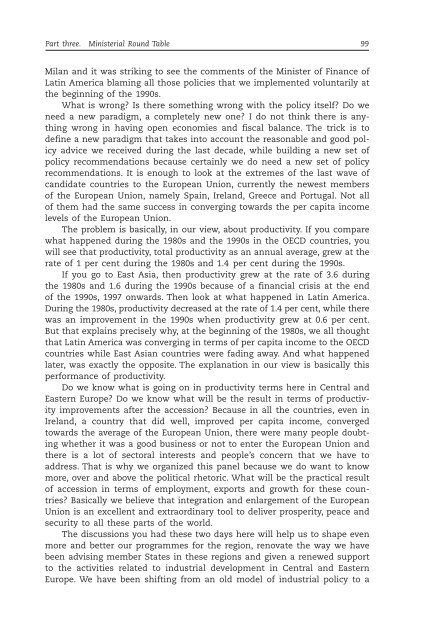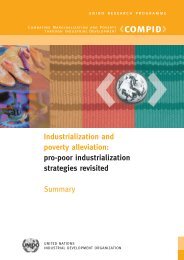TECHNOLOGY FORESIGHT SUMMIT - Unido
TECHNOLOGY FORESIGHT SUMMIT - Unido
TECHNOLOGY FORESIGHT SUMMIT - Unido
You also want an ePaper? Increase the reach of your titles
YUMPU automatically turns print PDFs into web optimized ePapers that Google loves.
Part three. Ministerial Round Table 99<br />
Milan and it was striking to see the comments of the Minister of Finance of<br />
Latin America blaming all those policies that we implemented voluntarily at<br />
the beginning of the 1990s.<br />
What is wrong? Is there something wrong with the policy itself? Do we<br />
need a new paradigm, a completely new one? I do not think there is anything<br />
wrong in having open economies and fiscal balance. The trick is to<br />
define a new paradigm that takes into account the reasonable and good policy<br />
advice we received during the last decade, while building a new set of<br />
policy recommendations because certainly we do need a new set of policy<br />
recommendations. It is enough to look at the extremes of the last wave of<br />
candidate countries to the European Union, currently the newest members<br />
of the European Union, namely Spain, Ireland, Greece and Portugal. Not all<br />
of them had the same success in converging towards the per capita income<br />
levels of the European Union.<br />
The problem is basically, in our view, about productivity. If you compare<br />
what happened during the 1980s and the 1990s in the OECD countries, you<br />
will see that productivity, total productivity as an annual average, grew at the<br />
rate of 1 per cent during the 1980s and 1.4 per cent during the 1990s.<br />
If you go to East Asia, then productivity grew at the rate of 3.6 during<br />
the 1980s and 1.6 during the 1990s because of a financial crisis at the end<br />
of the 1990s, 1997 onwards. Then look at what happened in Latin America.<br />
During the 1980s, productivity decreased at the rate of 1.4 per cent, while there<br />
was an improvement in the 1990s when productivity grew at 0.6 per cent.<br />
But that explains precisely why, at the beginning of the 1980s, we all thought<br />
that Latin America was converging in terms of per capita income to the OECD<br />
countries while East Asian countries were fading away. And what happened<br />
later, was exactly the opposite. The explanation in our view is basically this<br />
performance of productivity.<br />
Do we know what is going on in productivity terms here in Central and<br />
Eastern Europe? Do we know what will be the result in terms of productivity<br />
improvements after the accession? Because in all the countries, even in<br />
Ireland, a country that did well, improved per capita income, converged<br />
towards the average of the European Union, there were many people doubting<br />
whether it was a good business or not to enter the European Union and<br />
there is a lot of sectoral interests and people’s concern that we have to<br />
address. That is why we organized this panel because we do want to know<br />
more, over and above the political rhetoric. What will be the practical result<br />
of accession in terms of employment, exports and growth for these countries?<br />
Basically we believe that integration and enlargement of the European<br />
Union is an excellent and extraordinary tool to deliver prosperity, peace and<br />
security to all these parts of the world.<br />
The discussions you had these two days here will help us to shape even<br />
more and better our programmes for the region, renovate the way we have<br />
been advising member States in these regions and given a renewed support<br />
to the activities related to industrial development in Central and Eastern<br />
Europe. We have been shifting from an old model of industrial policy to a

















